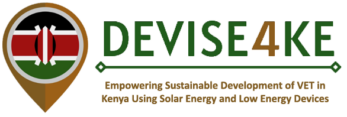Our project was highlighted in the local digital magazine on Durango, Durangon. The English translation of the article is below, but you can read the original Spanish article here. Read another article in Spanish here.
Maristak Durango teachers will work on educational progress in rural areas of Kenya
Zornotzarras Beñat Goikoetxea and Jon Batiz, professors of the higher cycle in Electrotechnical and Automated Systems at Maristak Durango, will embark on an educational project this summer in rural areas of Kenya. Accompanied by another teacher from the center who knows the area, Berriztarra Iratxe Lejarreta, they will manage the installation of solar panels in schools to advance digitalization and educational progress in the African country.
Goikoetxea and Batiz will focus their work on Homa Bay county, a rural area in western Kenya, “without being very aware of what we are really going to find,” they joke. “Until now we have been working from a distance and our reality, but we are aware of the difference and we are prepared to encounter any unforeseen event.”
There, they will work on the installation of solar panels and guaranteeing their “long-term” use. To do this, “it is important to implement adequate training and establish a community maintenance plan to develop local technical support. These measures ensure that the community not only benefits from renewable energy, but also develops the capacity to manage and preserve this vital infrastructure for its autonomous and sustainable development.”
With this “grain of sand”, these zornotzarras hope to improve the quality of life of the population of the area “by creating jobs, increasing access to education and strengthening local infrastructure. Collaboration is very important for the long-term success of these types of projects, and in this case we have the collaboration of community leaders to ensure that these types of initiatives meet the real needs of the local population.”
University of Bremen
The initiative, carried out in collaboration with the NGO SED, is part of an international Erasmus+ project in which the University of Bremen, which they recently visited, also participates. At the German faculty they have had the opportunity to learn about its Vocational Training system and gain ideas applicable to the Durango center.
They have also held meetings with coordinators of the international DEVIS4KE project to work on training local teachers “with the aim of improving their educational infrastructure and empowering them with knowledge in renewable energy.”
The knowledge acquired through this summer’s initiative will enrich Electrotechnical Systems and Automation students. “Both students and teachers of the cycle play a fundamental role in this project,” say Goikoetxea and Batiz. “The two professors who currently participate in the energy part play an important role in establishing the technical and educational bases of the program. Additionally, experience and knowledge are required to ensure that the installation of solar panels is done correctly and that the basic concepts are conveyed effectively.”
“Real world” problems
For the next course, they intend to include this project as a challenge in the classroom, where students will have the opportunity to apply their theoretical knowledge in a practical and realistic context. “This will not only enrich their learning, but will also provide them with valuable experience in solving real-world problems. By facing authentic challenges, they will be able to develop critical skills such as teamwork, innovation and adaptability in environments they are not accustomed to,” they highlight.
Furthermore, their direct participation in a project with positive social and environmental impact “can be very motivating. This allows them to see the tangible effect of their work, help the progress of another country with their knowledge and understand the importance of renewable energy and sustainability in today’s world,” they conclude.



